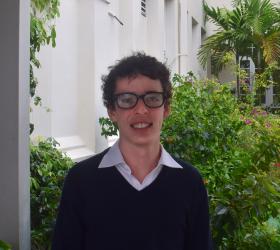
Jan 26, 2016
Marimbist by Mistake
Spotlight Date:
January 27, 2016 Download Original]" class="imagefield imagefield-lightbox2 imagefield-lightbox2-spotlight_thumb imagefield-field_spotlight_photo imagecache imagecache-field_spotlight_photo imagecache-spotlight_thumb imagecache-field_spotlight_photo-spotlight_thumb">

Charles Comiter majors in percussion at Dreyfoos, but when he isn’t playing the marimba, you might see him practicing piano or playing the accordion with the school’s Klezmer Band. “I love classical music and the repertoire of symphony orchestra music more than anything. As far as my marimba playing, which serves as my vehicle of playing solo repertoire, I draw inspiration from the great virtuoso pianists of the past century, such as Horowitz and Rachmaninoff. I take many of the great works of the piano and other instrumental repertoires and adapt them for the marimba.”
Although Charles started playing piano at age 5, music didn’t stick until a happy accident placed him in a band class in 6th grade. “That forced me to choose percussion; in retrospect, I'm unbelievably happy I was guided to this choice.” That choice has landed Charles at multiple summer programs including Boston University Tanglewood Institute and the Great Plains International Marimba Competition, where he earned acclaim for his marimba playing.
“The competitors came from everywhere from Texas to Japan; the judges were percussion professors from schools as prestigious as the Eastman School of Music. I competed in the High School Division; the talent level was absolutely unbelievable. One of my competitors was a student of Keiko Abe, one of the best marimba players in the world, from Japan. I managed to win First Place in the High School Division; the exposure I experienced there was unbelievable and really pushed me to the next level in my marimba playing.”
After attending Tanglewood this past summer, Charles was tasked with composing the music for the Dreyfoos Theatre Department’s production of “Romeo & Juliet”, a production that is now headed to the State Thespian Festival.
“Mr. Barfield approached me about writing a score for the play last May. The task seemed pretty huge, I mean like Donald-Trump-level huge, so I was initially a little bit reluctant about agreeing to do it. I thought about it a little more and realized it would be a great opportunity to explore musical composition: something I had always thought about but had never given real effort to… I was having a lot of trouble with writing something, so I just thought to myself ‘keep it simple. Maybe something good will come out.’ So I sat down at the piano and played three notes; I expanded on them a little bit and had the theme for the beginning of the play. I took this approach for every number in the score; it worked out pretty well. The end product was really special. It gave an extra dimension of beauty to the play that Shakespeare left us with.”
When Charles isn’t busy practicing, playing, or composing music, he is doing math. “I really like math. It's a fun mental activity and gives my mind a little bit of a rest from constantly thinking about music all day. I also enjoy community service and tutoring. I started and run a club at Dreyfoos called the Mathematical Outreach Program that provides mathematics tutoring to underprivileged children throughout Palm Beach County.”
Looking towards the future, Charles hopes to attend a college that offers him a chance to pursue both his love of music and academics. “I have always been interested in and devoted to academia, particularly in math and the physical sciences. Dual degree programs, such as between Harvard and the New England Conservatory, Columbia and the Juilliard School, Yale and the Yale School of Music, Johns Hopkins and the Peabody Conservatory, Northwestern and the Northwestern School of Music, and many others would allow me to pursue my passions in one unified collegiate setting.”
As he decides on a career path, Charles knows that the skills acquired through his musical training will give him the critical thinking skills, character, and discipline needed to be successful. “I would love to be an orchestral conductor, arts administrator, orchestral percussionist, professor, or mathematician.”
Charles has many passions and a lot of decisions to make, but he knows one thing for sure – “Dreyfoos started everything. Being in Dreyfoos' environment gave me that first push to start serious musical training. I wouldn’t’ve gotten that push at any other school; I'm very grateful for that.”


